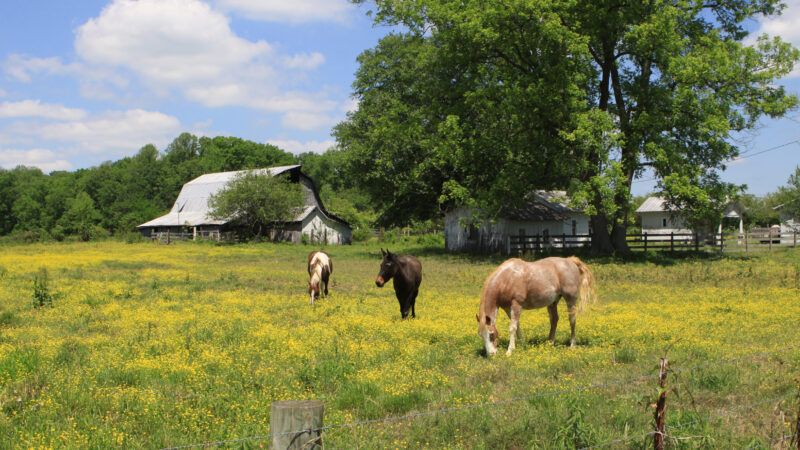Tennessee Will Not Appeal Ruling Over Wildlife Agents Planting Cameras
While the decision is great news for Tennesseans, it's only the first step in reclaiming Americans' property rights against the open fields doctrine.

In May, the Tennessee Court of Appeals ruled against the state after wildlife agents trespassed onto private land and planted cameras to look for hunting violations. This week, the Tennessee Attorney General's Office declined to file an appeal, meaning the ruling is affirmed. It's a good first step in reclaiming Americans' property rights.
State law allows officers of the Tennessee Wildlife Resource Agency (TWRA)—or any other state or federal wildlife agency—to "go upon any property, outside of buildings, posted or otherwise," in order to "enforce all laws relating to wildlife." As Reason first reported in 2022, TWRA agents interpreted this directive to trespass onto private lands at will; in at least two cases, agents then coordinated with federal wildlife officers to plant trail cameras without a warrant and without the property owner's knowledge or permission. One man who found a camera on his land took it down, at which point agents raided his home and arrested him for "stolen government property."
Under Supreme Court precedent dating back to a century-old Prohibition case, "open fields" do not receive the same constitutional protections as a person's home and the "curtilage," the area immediately around the home. In Hester v. United States (1924), Justice Oliver Wendell Holmes wrote that "the protection accorded by the Fourth Amendment to the people in their 'persons, houses, papers, and effects,' does not extend to open fields."
The two Tennessean property owners sued in 2022, claiming that the state law violated the Tennessee Constitution. Article I, Section 7 of the Tennessee Constitution uses very similar language to the Fourth Amendment—only swapping out "effects" with "possessions"—but goes even further, adding "that general warrants, whereby an officer may be commanded to search suspected places, without evidence of the fact committed, or to seize any person or persons not named, whose offences are not particularly described and supported by evidence, are dangerous to liberty and ought not be granted."
The district court agreed, finding that "Tennessee's prohibition on unreasonable searches offers a broader guarantee of security for an individual's real property than its federal counterpart."
The state appealed the ruling, and in May 2024, the Tennessee Court of Appeals affirmed the district court's ruling. While the appeals court stopped short of finding the state law unconstitutional, as the district court had done, it nonetheless found the TWRA's application of it "a disturbing assertion of power on behalf of the government that stands contrary to the foundations of the search protections against arbitrary governmental intrusions in the American legal tradition, generally, and in Tennessee, specifically."
To appeal a judgment to the state supreme court, Tennessee code provides "60 days after the entry of the judgment." The deadline for the state to appeal the decision in this case passed on July 9. (The Tennessee Attorney General's office did not respond to Reason's request for comment.) As a result, the decision is now settled law in the state, although a separate case could make its way to the state supreme court in the future.
The ruling is great news for Tennesseans, as is the state's decision to let it stand. It provides further protection against unwarranted intrusion and surveillance at the hands of government agents. But it's only the first step in undoing a century of harmful jurisprudence.
After all, the ruling only applies to the state constitution, leaving the open fields doctrine untouched. As a result, any federal wildlife agent is still free to come onto your land with impunity and even plant cameras at will, so long as they keep a distance from your home.
The practice also varies by state law. As Reason documented in 2022, some states will only plant cameras on private property with a warrant or the owner's permission, while others claim free rein to come onto private land and place cameras.
All is not lost: Tennessee joins several other states that have affirmed greater privacy protections than the Fourth Amendment allows. As far back as 1970, the Mississippi Supreme Court decided in Davidson v. State, "This right to be secure from invasions of privacy by government officials is a basic freedom in our Federal and State constitutional systems." In 2018, the Vermont Supreme Court affirmed in State v. Dupuis that "Vermont's Constitution establishes greater protection against search and seizure of 'open fields' than the U.S. Constitution, requiring that law enforcement officers secure warrants before searching open fields when the landowner demonstrates an expectation of privacy."


Show Comments (12)